最新中考英语语法专题复习 代词 课件(共24张PPT)
文档属性
| 名称 | 最新中考英语语法专题复习 代词 课件(共24张PPT) | 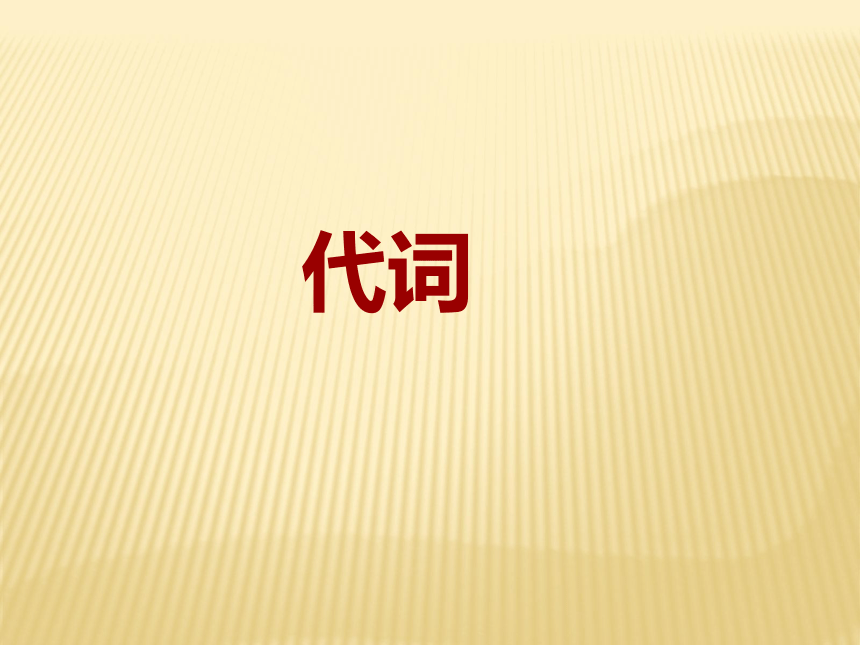 | |
| 格式 | ppt | ||
| 文件大小 | 1.9MB | ||
| 资源类型 | 教案 | ||
| 版本资源 | 通用版 | ||
| 科目 | 英语 | ||
| 更新时间 | 2022-10-16 07:34:36 | ||
图片预览

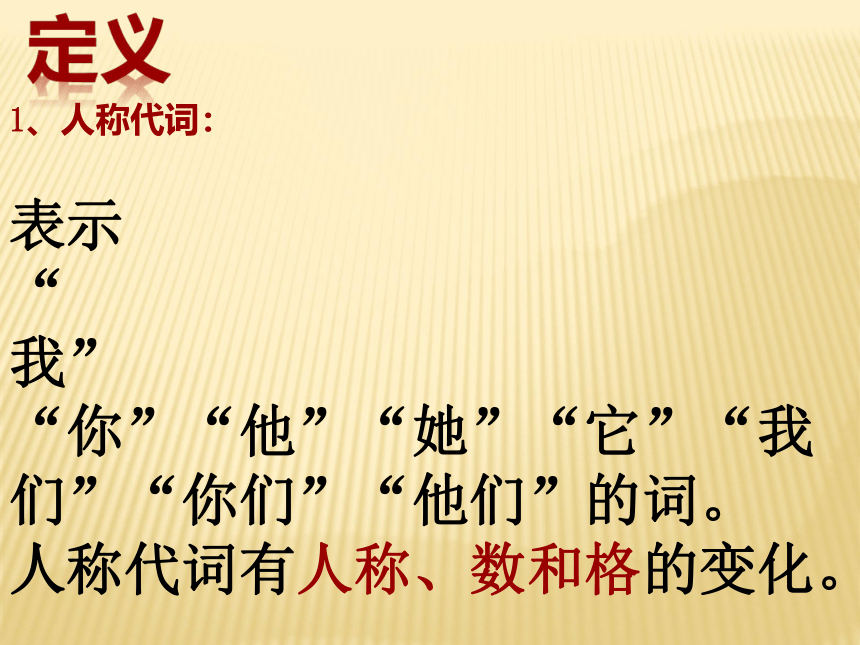
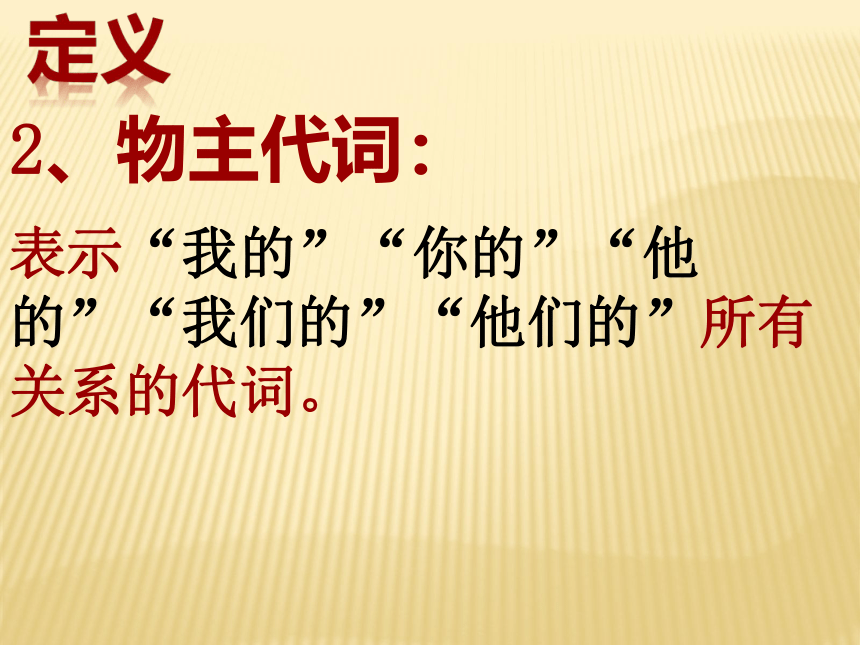
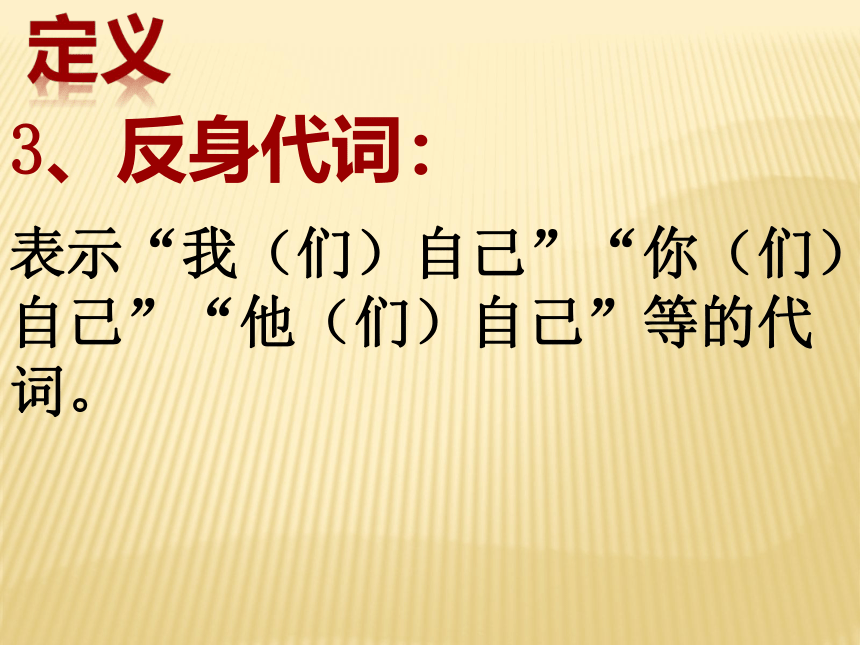
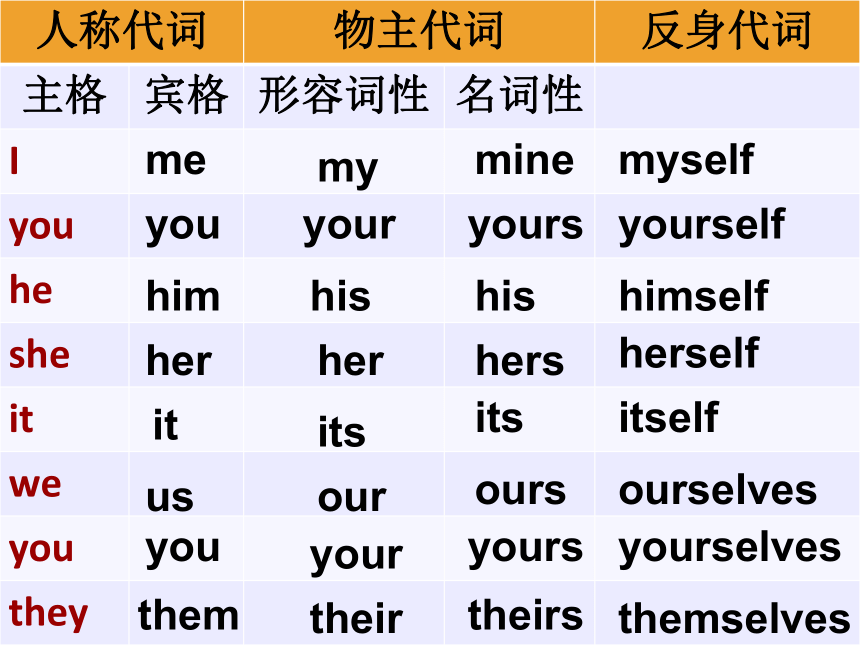
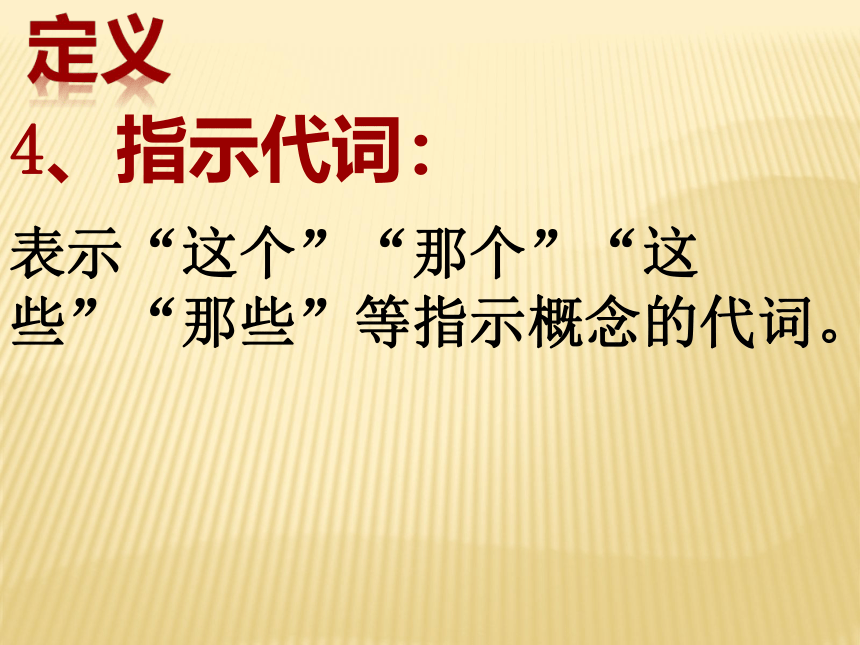
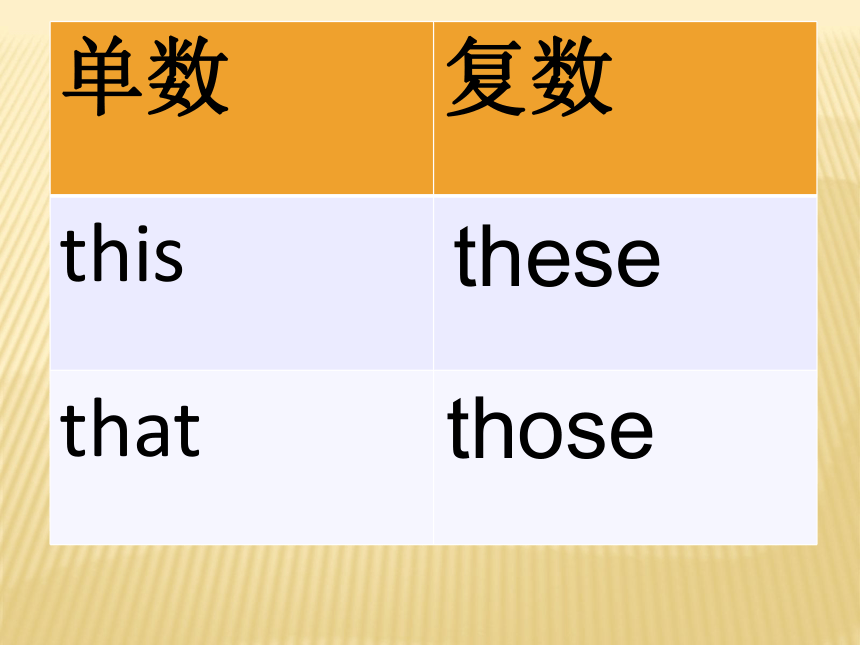
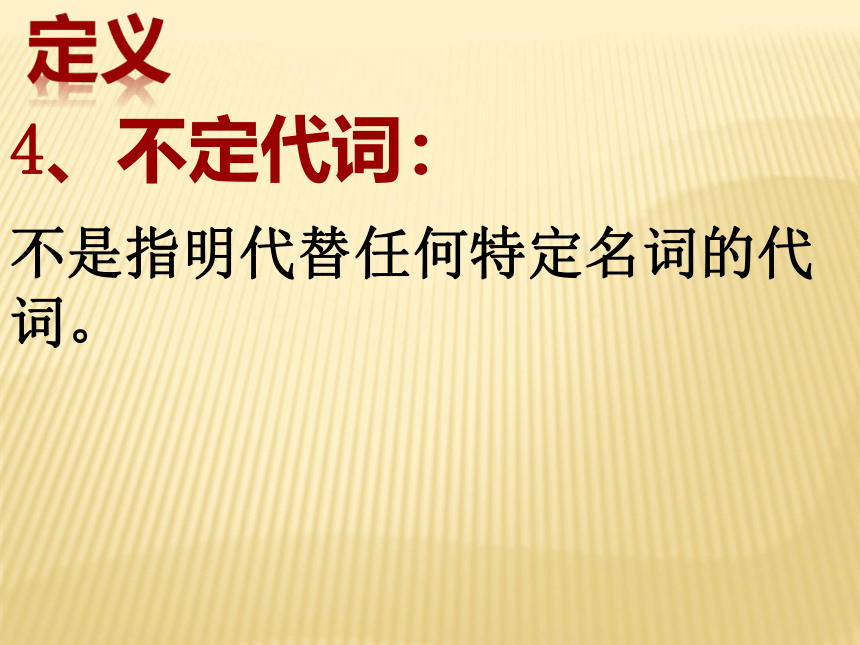
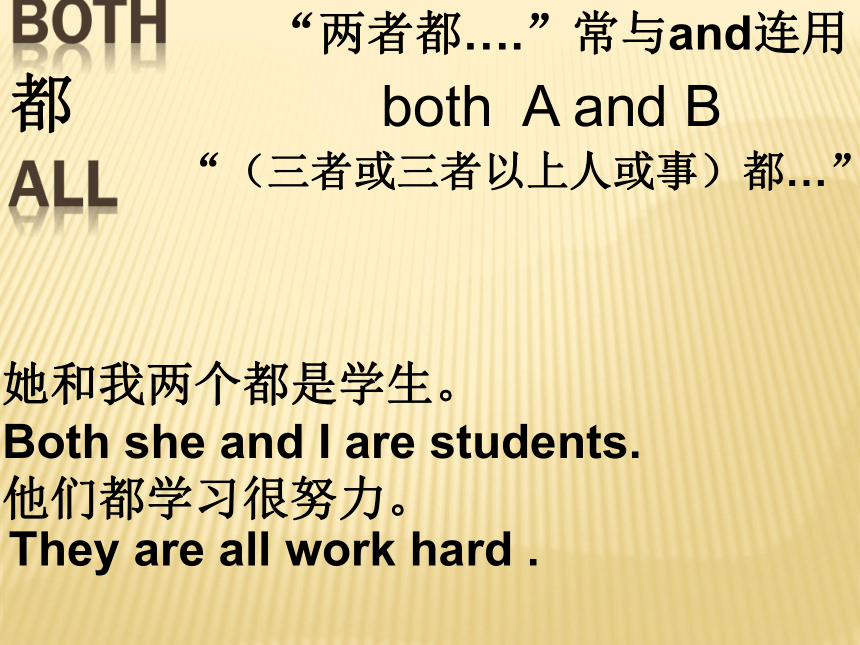
文档简介
(共24张PPT)
代词
1、人称代词:
表示“我”“你”“他”“她”“它”“我们”“你们”“他们”的词。
人称代词有人称、数和格的变化。
2、物主代词:
表示“我的”“你的”“他的”“我们的”“他们的”所有关系的代词。
3、反身代词:
表示“我(们)自己”“你(们)自己”“他(们)自己”等的代词。
人称代词 物主代词 反身代词
主格 宾格 形容词性 名词性
I
you
he
she
it
we
you
they
me
you
him
her
it
us
you
them
his
yours
mine
hers
its
our
your
their
myself
yourself
his
her
my
your
its
ours
yours
theirs
himself
herself
itself
ourselves
yourselves
themselves
4、指示代词:
表示“这个”“那个”“这些”“那些”等指示概念的代词。
单数 复数
this
that
these
those
4、不定代词:
不是指明代替任何特定名词的代词。
“两者都….”常与and连用
both A and B
都
“(三者或三者以上人或事)都…”
她和我两个都是学生。
Both she and I are students.
他们都学习很努力。
They are all work hard .
注:all 指人用复数,指事用单数。
e.g. 大家都在这里。All ____ here.
全都结束了。 All ____ over.
are
is
one
ones
“一个”
“一些”
给我本一书。绿色的那本。
Give me a book . the green one.
这些苹果不红。给我些红苹果吧。
These apples are not red . Give me some red ones.
either
两者中的任一个,表肯定 either … or …
两者都不,表否定 neither … nor…
无人,表否定
neither
no one
两个女孩中的任一个都是莉莉的同学。
Either of the girls is Lily’s classmate.
两个女孩中的任一个都不是莉莉的同学。
Neither of the girls is Lily’s classmate.
我有两本书,你可以拿走任意一本。
I have two books, and you can take either one.
无人知道此事。
No one knows it.
固定搭配:either / neither of + 名(代)词复数 +谓语动词单三
many
much
“许多”+可数n.复数
“许多”+ 不可数n.
课桌上有许多书。
There are many books on the desk.
瓶子里有许多水。
There is much water in the bottle.
many, much, a lot of = lots of
a few
few
“有一些”+可数n.复数(肯定)
“几乎没有”+ 可数n.复数(否定)
我没有几本好书。(否定)
I have few good books.
在这里我有一些好朋友。(肯定)
I have a few good friends here.
a little
little
“有一点” + 不可数n.(肯定)
“几乎没有”+ 不可数n. (否定)
我身上没带钱。
I have little money .
我身上带了点钱。
I have a little money.
some
any
都可以修饰可数/ 不可数n.
肯定句
否定句/疑问句
一些男孩在踢足球。
Some boys are playing football.
我不想要牛奶,我想要些红茶。
I don’t want _____ milk, I want _____ black tea.
any
some
注意:表示“邀请”的一般疑问句,若说话人想要得到肯定的回答,则用some不用any.
— Would you like _____ coffee
— Yes, please./ No, thanks. I don’t want ____ coffee.
some
any
(谓语动词用单数)
each
every
每一个
强调“个体”,可用来指两个或两个以上的人或事物。
强调“全体”,只可指三个或三个以上的人或事物。
each , every
他课桌上的每本书都值得一读。
Each book on his desk is worth reading.
我俩每个人都穿了件红外套。
Each of us wears a red coat.
路的两边都是树。
There are some trees on each side of the street.
每个同学都通过了考试。
Every student passed the exam.
20人
1人WC
1人office
one
the other
another
19人
18人
another:三者以上的另一个。
the other:两者中的另一个;或是三者以上的另一些。
其余的学生在哪?
Where are the other students
我不喜欢这些笔,拿些别的让我看看。
I don’t like these pens , show me some others.
班里有15个学生,其中10个是男孩,其他的是女孩。
There are fifty students in our class . Ten of them are boys. The others are girls.
Others:其余的人或物,数量不准确。
The others:两部分中的另一些,数量较准确
不定代词
意义
用法说明
the other
两者中另一个 常与one 连用,构成“one… the other …”;
或是三者以上的另一些。
others 泛指别的人或物(不是全部)
数量不确定,不能做定语,常构成“some … others ….”
the others 两部分中的另一些
特指其余的人或物,数量较确定
another 三者以上的另一个 指三者以上的任一个
one body thing where
every everyone everybody everything everywhere
no no one
nobody
nothing
nowhere
any anyone
anybody
anything
anywhere
some someone
somebody
something
somewhere
代词
1、人称代词:
表示“我”“你”“他”“她”“它”“我们”“你们”“他们”的词。
人称代词有人称、数和格的变化。
2、物主代词:
表示“我的”“你的”“他的”“我们的”“他们的”所有关系的代词。
3、反身代词:
表示“我(们)自己”“你(们)自己”“他(们)自己”等的代词。
人称代词 物主代词 反身代词
主格 宾格 形容词性 名词性
I
you
he
she
it
we
you
they
me
you
him
her
it
us
you
them
his
yours
mine
hers
its
our
your
their
myself
yourself
his
her
my
your
its
ours
yours
theirs
himself
herself
itself
ourselves
yourselves
themselves
4、指示代词:
表示“这个”“那个”“这些”“那些”等指示概念的代词。
单数 复数
this
that
these
those
4、不定代词:
不是指明代替任何特定名词的代词。
“两者都….”常与and连用
both A and B
都
“(三者或三者以上人或事)都…”
她和我两个都是学生。
Both she and I are students.
他们都学习很努力。
They are all work hard .
注:all 指人用复数,指事用单数。
e.g. 大家都在这里。All ____ here.
全都结束了。 All ____ over.
are
is
one
ones
“一个”
“一些”
给我本一书。绿色的那本。
Give me a book . the green one.
这些苹果不红。给我些红苹果吧。
These apples are not red . Give me some red ones.
either
两者中的任一个,表肯定 either … or …
两者都不,表否定 neither … nor…
无人,表否定
neither
no one
两个女孩中的任一个都是莉莉的同学。
Either of the girls is Lily’s classmate.
两个女孩中的任一个都不是莉莉的同学。
Neither of the girls is Lily’s classmate.
我有两本书,你可以拿走任意一本。
I have two books, and you can take either one.
无人知道此事。
No one knows it.
固定搭配:either / neither of + 名(代)词复数 +谓语动词单三
many
much
“许多”+可数n.复数
“许多”+ 不可数n.
课桌上有许多书。
There are many books on the desk.
瓶子里有许多水。
There is much water in the bottle.
many, much, a lot of = lots of
a few
few
“有一些”+可数n.复数(肯定)
“几乎没有”+ 可数n.复数(否定)
我没有几本好书。(否定)
I have few good books.
在这里我有一些好朋友。(肯定)
I have a few good friends here.
a little
little
“有一点” + 不可数n.(肯定)
“几乎没有”+ 不可数n. (否定)
我身上没带钱。
I have little money .
我身上带了点钱。
I have a little money.
some
any
都可以修饰可数/ 不可数n.
肯定句
否定句/疑问句
一些男孩在踢足球。
Some boys are playing football.
我不想要牛奶,我想要些红茶。
I don’t want _____ milk, I want _____ black tea.
any
some
注意:表示“邀请”的一般疑问句,若说话人想要得到肯定的回答,则用some不用any.
— Would you like _____ coffee
— Yes, please./ No, thanks. I don’t want ____ coffee.
some
any
(谓语动词用单数)
each
every
每一个
强调“个体”,可用来指两个或两个以上的人或事物。
强调“全体”,只可指三个或三个以上的人或事物。
each , every
他课桌上的每本书都值得一读。
Each book on his desk is worth reading.
我俩每个人都穿了件红外套。
Each of us wears a red coat.
路的两边都是树。
There are some trees on each side of the street.
每个同学都通过了考试。
Every student passed the exam.
20人
1人WC
1人office
one
the other
another
19人
18人
another:三者以上的另一个。
the other:两者中的另一个;或是三者以上的另一些。
其余的学生在哪?
Where are the other students
我不喜欢这些笔,拿些别的让我看看。
I don’t like these pens , show me some others.
班里有15个学生,其中10个是男孩,其他的是女孩。
There are fifty students in our class . Ten of them are boys. The others are girls.
Others:其余的人或物,数量不准确。
The others:两部分中的另一些,数量较准确
不定代词
意义
用法说明
the other
两者中另一个 常与one 连用,构成“one… the other …”;
或是三者以上的另一些。
others 泛指别的人或物(不是全部)
数量不确定,不能做定语,常构成“some … others ….”
the others 两部分中的另一些
特指其余的人或物,数量较确定
another 三者以上的另一个 指三者以上的任一个
one body thing where
every everyone everybody everything everywhere
no no one
nobody
nothing
nowhere
any anyone
anybody
anything
anywhere
some someone
somebody
something
somewhere
同课章节目录
